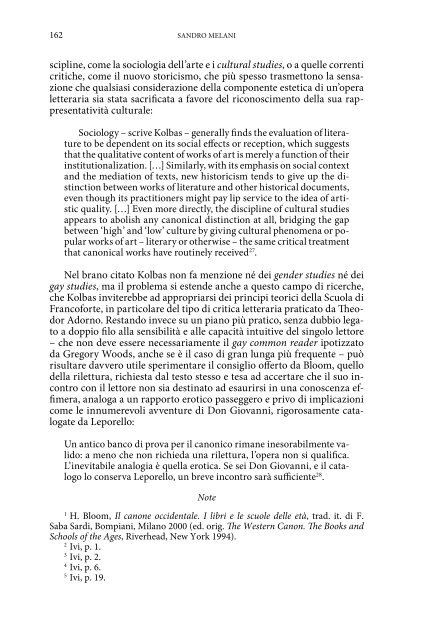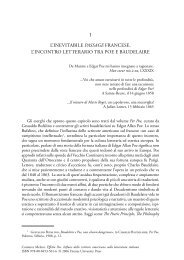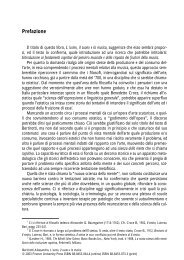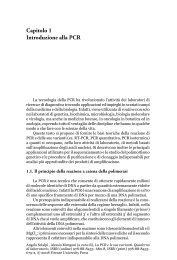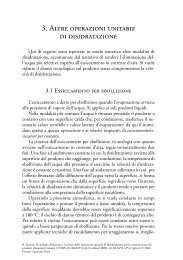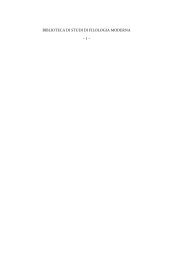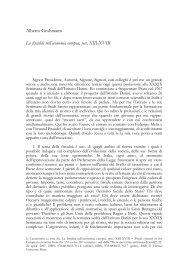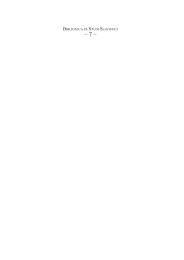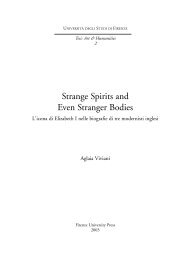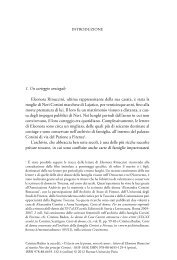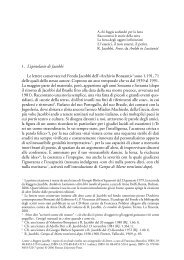162 sandro melani scipline, come la sociologia dell’arte e i cultural stu<strong>di</strong>es, o a quelle correnti critiche, come il nuovo storicismo, che più spesso trasmettono la sensazione che qualsiasi considerazione della componente estetica <strong>di</strong> un’opera letteraria sia stata sacrificata a favore del riconoscimento della sua rappresentatività culturale: sociology <strong>–</strong> scrive Kolbas <strong>–</strong> generally finds the evaluation of literature to be dependent on its social effects or reception, which suggests that the qualitative content of works of art is merely a function of their institutionalization. […] similarly, with its emphasis on social context and the me<strong>di</strong>ation of texts, new historicism tends to give up the <strong>di</strong>stinction between works of literature and other historical documents, even though its practitioners might pay lip service to the idea of artistic quality. […] even more <strong>di</strong>rectly, the <strong>di</strong>scipline of cultural stu<strong>di</strong>es appears to abolish any canonical <strong>di</strong>stinction at all, bridging the gap between ‘high’ and ‘low’ culture by giving cultural phenomena or popular works of art <strong>–</strong> literary or otherwise <strong>–</strong> the same critical treatment that canonical works have routinely received 27 . nel brano citato Kolbas non fa menzione né dei gender stu<strong>di</strong>es né dei gay stu<strong>di</strong>es, ma il problema si estende anche a questo campo <strong>di</strong> ricerche, che Kolbas inviterebbe ad appropriarsi dei principi teorici della scuola <strong>di</strong> francoforte, in particolare del tipo <strong>di</strong> critica letteraria praticato da Theodor adorno. restando invece su un piano più pratico, senza dubbio legato a doppio filo alla sensibilità e alle capacità intuitive del singolo lettore <strong>–</strong> che non deve essere necessariamente il gay common reader ipotizzato da gregory Woods, anche se è il caso <strong>di</strong> gran lunga più frequente <strong>–</strong> può risultare davvero utile sperimentare il consiglio offerto da bloom, quello della rilettura, richiesta dal testo stesso e tesa ad accertare che il suo incontro con il lettore non sia destinato ad esaurirsi in una conoscenza effimera, analoga a un rapporto erotico passeggero e privo <strong>di</strong> implicazioni come le innumerevoli avventure <strong>di</strong> don giovanni, rigorosamente catalogate da leporello: un antico banco <strong>di</strong> prova per il canonico rimane inesorabilmente valido: a meno che non richieda una rilettura, l’opera non si qualifica. l’inevitabile analogia è quella erotica. se sei don giovanni, e il catalogo lo conserva leporello, un breve incontro sarà sufficiente 28 . Note 1 H. bloom, Il canone occidentale. I libri e le scuole delle età, trad. it. <strong>di</strong> f. saba sar<strong>di</strong>, bompiani, milano 2000 (ed. orig. The Western Canon. The Books and Schools of the Ages, riverhead, new York 1994). 2 ivi, p. 1. 3 ivi, p. 2. 4 ivi, p. 6. 5 ivi, p. 19.
il canone gaY 163 6 cfr. H. bloom, The Anxiety of Influence: A Theory of Poetry, oxford university <strong>Press</strong>, new York 1973 (trad. it. <strong>di</strong> m. <strong>di</strong>acono, L’angoscia dell’influenza, feltrinelli, milano 1983). 7 ivi, p. 25. 8 cfr. a. rich, Compulsory heterosexuality and lesbian Existence, onlywomen <strong>Press</strong>, london 1981 (trad. it. <strong>di</strong> m.l. moretti, Eterosessualità obbligatoria ed esistenza lesbica, «dwf», 23-24, 1985, pp. 5-40). 9 cfr. in particolare la produzione saggistica <strong>di</strong> eve Kosofsky sedwick (Between Men: Literature and Male Homosocial Desire, columbia university <strong>Press</strong>, new York 1985; Epistemology of the Closet, duke university <strong>Press</strong>, durham, n.c. 1991, e Tendencies, duke university <strong>Press</strong>, durham, n.c. 1993), Ju<strong>di</strong>th butler (Gender Trouble: Feminism and the Subversion of Identity, routledge, london 1990 (trad. it. <strong>di</strong> r. Zuppet, Scambi <strong>di</strong> genere. Identità, sesso e desiderio, sansoni, firenze 2004) e Bo<strong>di</strong>es That Matter: On the Discoursive Limits of ‘Sex’, routledge, london 1993 (trad. it. <strong>di</strong> s. capelli, Corpi che contano. I limiti <strong>di</strong>scorsivi del ‘sesso’, feltrinelli, milano 1996) e teresa de lauretis (Soggetti eccentrici, feltrinelli, milano 1999). <strong>10</strong> r.l. chapman, The Dictionary of American Slang, Pan books, london 1988, p. 159. 11 cfr. r.a. spears, Slang and Euphemism, new american library, new York 1982. 12 g. Woods, A History of Gay Literature: The Male Tra<strong>di</strong>tion, Yale university <strong>Press</strong>, new Haven-london 1998. il suo articolo, Literary Historiography and the Gay Common Reader, è stato consultato sul sito (<strong>10</strong>/12/2007). 13 cfr. m. foucault, Storia della sessualità 1. La volontà <strong>di</strong> sapere, trad. it. <strong>di</strong> P. Pasquino e g. Procacci, feltrinelli, milano 2005; 2. L’uso dei piaceri, trad. it. <strong>di</strong> l. guarino, feltrinelli, milano 2004; 3. La cura <strong>di</strong> sé, trad. it. <strong>di</strong> l. guarino, feltrinelli, milano 2004 (ed. orig. Histoire de la sexualité 1. La Volonté de savoir, gallimard, Paris 1976; 2. L’Usage des plaisirs, gallimard, Paris 1984; 3. Le Souci de soi, gallimard, Paris 1984). 14 m. foucault, La volontà <strong>di</strong> sapere, cit., p. 94. 15 cfr. c. craft, Another Kind of Love: Male Homosexual Desire in English Discourse 1850-1920, university of california <strong>Press</strong>, berkeley 1994. si veda in particolare il primo capitolo, Alias sodomy, pp. 1-43. 16 m. foucault, La volontà <strong>di</strong> sapere, cit., pp. 42-43. 17 ivi, pp. 90-91. 18 cfr. J. Weeks, Coming Out: Homosexual Politics in Britain from the Nineteenth Century to the Present, Quartet, london-new York 1977, ed. rivista 1990, a cui Weeks ha fatto seguire Sex, Politics, and Society: The Regulation of Sexuality since 1800, longman, london 1989; d. Halperin, One Hundred Years of Homosexuality, routledge, london 1989; g. robb, Strangers: Homosexual Love in the Nineteenth Century, Picador, london 2003 (trad. it. <strong>di</strong> m. baiocchi, Sconosciuti. L’amore e la cultura omosessuale nell’Ottocento, carocci, roma 2005). 19 cfr., rispettivamente, a. sinfield, The Wilde Century: Effeminacy, Oscar Wilde and the Queer Moment, cassell, london 1994; J. bristow, Effeminate England: Homoerotic Writing after 1885, open university <strong>Press</strong>, buckingham 1995; K. Kopelson, Loves’ Litany: The Writing of Modern Homoerotics, stanford university <strong>Press</strong>, stanford, ca 1994; r. dellamora, Masculine Desire. The Sexual Politics of Victorian Aestheticism, university of north carolina <strong>Press</strong>, chapel Hill-
- Page 1 and 2:
iblioteca di studi di filologia mod
- Page 3 and 4:
altri canoni / canoni altri plurali
- Page 5:
indice Premessa 7 ornella de Zordo,
- Page 8 and 9:
8 altri canoni / canoni altri feder
- Page 11 and 12:
‘in PrinciPio era il canone’: P
- Page 13 and 14:
in PrinciPio era il canone 13 tutto
- Page 15 and 16:
in PrinciPio era il canone 15 vocab
- Page 17 and 18:
in PrinciPio era il canone 17 mo si
- Page 19 and 20:
in PrinciPio era il canone 19 stata
- Page 21 and 22:
in PrinciPio era il canone 21 relig
- Page 23 and 24:
in PrinciPio era il canone 23 bia c
- Page 25 and 26:
in PrinciPio era il canone 25 13 J.
- Page 27 and 28:
in PrinciPio era il canone 27 bloom
- Page 29 and 30:
PerformatiVità del canone Federica
- Page 31 and 32:
PerformatiVita’ del canone 31 mat
- Page 33 and 34:
PerformatiVita’ del canone 33 aus
- Page 35 and 36:
PerformatiVita’ del canone 35 il
- Page 37 and 38:
PerformatiVita’ del canone 37 cit
- Page 39 and 40:
PerformatiVita’ del canone 39 la
- Page 41 and 42:
PerformatiVita’ del canone 41 con
- Page 43 and 44:
PerformatiVita’ del canone 43 lin
- Page 45:
PerformatiVita’ del canone 45 lyo
- Page 48 and 49:
48 alessandra calancHi nito di rece
- Page 50 and 51:
50 alessandra calancHi li si studia
- Page 52 and 53:
52 alessandra calancHi un’importa
- Page 54 and 55:
54 3. Nobili natali alessandra cala
- Page 56 and 57:
56 alessandra calancHi in italia l
- Page 58 and 59:
58 alessandra calancHi goohan, dove
- Page 60 and 61:
60 alessandra calancHi tore del pro
- Page 62 and 63:
62 alessandra calancHi 22 f. capra,
- Page 64 and 65:
64 alessandra calancHi calanchi ale
- Page 67 and 68:
canone e Post-coloniale 1 Luisa Pè
- Page 69 and 70:
canone e Post-coloniale 69 il termi
- Page 71 and 72:
canone e Post-coloniale 71 tangibil
- Page 73 and 74:
canone e Post-coloniale 73 bloom, l
- Page 75 and 76:
canone e Post-coloniale 75 mondi
- Page 77 and 78:
canone e Post-coloniale 77 la rever
- Page 79 and 80:
canone e Post-coloniale 79 stata un
- Page 81 and 82:
canone e Post-coloniale 81 loro att
- Page 83 and 84:
canone e Post-coloniale 83 e cambia
- Page 85 and 86:
canone e Post-coloniale 85 audace»
- Page 87 and 88:
canone e Post-coloniale 87 gioco di
- Page 89 and 90:
canone e Post-coloniale 89 scopo di
- Page 91 and 92:
canone e Post-coloniale 91 mentale
- Page 93 and 94:
canone e Post-coloniale 93 promuove
- Page 95 and 96:
canone e Post-coloniale 95 negli ul
- Page 97 and 98:
canone e Post-coloniale 97 68 s. ru
- Page 99 and 100:
canone e Post-coloniale 99 107 The
- Page 101 and 102:
canone e Post-coloniale 101 dirlik
- Page 103 and 104:
canone e Post-coloniale 103 mcleod
- Page 105 and 106:
1. Introduzione il canone e la trad
- Page 107 and 108:
il canone e la traduZione 107 della
- Page 109 and 110:
2. André Lefevere. Le riscritture
- Page 111 and 112: il canone e la traduZione 111 sul p
- Page 113 and 114: il canone e la traduZione 113 ted l
- Page 115 and 116: il canone e la traduZione 115 immag
- Page 117 and 118: il canone e la traduZione 117 entra
- Page 119 and 120: il canone e la traduZione 119 zioni
- Page 121 and 122: il canone e la traduZione 121 3 a.
- Page 123 and 124: il canone e la traduZione 123 bassn
- Page 125 and 126: canone e BIOFICTION, i soggetti del
- Page 127 and 128: canone e BIOFICTION 127 che assume
- Page 129 and 130: canone e BIOFICTION 129 mata, l’i
- Page 131 and 132: canone e BIOFICTION 131 vo e provvi
- Page 133 and 134: canone e BIOFICTION 133 l’anacron
- Page 135 and 136: canone e BIOFICTION 135 non poche a
- Page 137 and 138: canone e BIOFICTION 137 indubbiamen
- Page 139 and 140: canone e BIOFICTION 139 rica, la su
- Page 141 and 142: canone e BIOFICTION 141 discussione
- Page 143 and 144: canone e BIOFICTION 143 26 la quest
- Page 145 and 146: canone e BIOFICTION 145 fiction bio
- Page 147 and 148: canone e BIOFICTION 147 zeeanamente
- Page 149 and 150: canone e BIOFICTION 149 86 «The ne
- Page 151: canone e BIOFICTION 151 Lives in Co
- Page 154 and 155: 154 sandro melani re, individuato s
- Page 156 and 157: 156 sandro melani canone gay parten
- Page 158 and 159: 158 sandro melani siva. È all’in
- Page 160 and 161: 160 sandro melani autoaffermazione
- Page 164 and 165: 164 sandro melani london 1990; l. d
- Page 166 and 167: 166 sandro melani reade brian (ed.)
- Page 168 and 169: 168 2. Canone vs canone lesbico mar
- Page 170 and 171: 170 maria micaela coPPola detrattor
- Page 172 and 173: 172 maria micaela coPPola canone le
- Page 174 and 175: 174 maria micaela coPPola important
- Page 176 and 177: 176 maria micaela coPPola Per illus
- Page 178 and 179: 178 maria micaela coPPola nissero
- Page 180 and 181: 180 maria micaela coPPola o dall’
- Page 182 and 183: 182 maria micaela coPPola dicato di
- Page 184 and 185: 184 maria micaela coPPola che trova
- Page 186 and 187: 186 maria micaela coPPola Va osserv
- Page 188 and 189: 188 maria micaela coPPola lungi dal
- Page 190 and 191: 190 maria micaela coPPola lesbico (
- Page 192 and 193: 192 maria micaela coPPola canone e
- Page 194 and 195: 194 maria micaela coPPola 43 c.r. s
- Page 196 and 197: 196 maria micaela coPPola graglia m
- Page 199 and 200: «canons die Hard» 1 . l’iPer-ca
- Page 201 and 202: «canons die Hard» 201 tica chiama
- Page 203 and 204: «canons die Hard» 203 ria umana»
- Page 205 and 206: «canons die Hard» 205 l’esito n
- Page 207 and 208: «canons die Hard» 207 who produce
- Page 209 and 210: «canons die Hard» 209 richiami e
- Page 211 and 212: «canons die Hard» 211 1935 (rivis
- Page 213 and 214:
«canons die Hard» 213 african_wri
- Page 215 and 216:
«canons die Hard» 215 punto dedic
- Page 217 and 218:
«canons die Hard» 217 vati da ope
- Page 219 and 220:
«canons die Hard» 219 Quasi a con
- Page 221 and 222:
«canons die Hard» 221 me il websi
- Page 223 and 224:
«canons die Hard» 223 cipalmente
- Page 225 and 226:
«canons die Hard» 225 book and a
- Page 227 and 228:
«canons die Hard» 227 a caratteri
- Page 229 and 230:
«canons die Hard» 229 me. l’ope
- Page 231 and 232:
«canons die Hard» 231 ceserani re
- Page 233 and 234:
«canons die Hard» 233 Williamson
- Page 235:
National Association of Scholars, .
- Page 238 and 239:
238 luigi marinelli ca, senza tutta
- Page 240 and 241:
240 luigi marinelli una delle carat
- Page 242 and 243:
242 luigi marinelli (della formazio
- Page 244 and 245:
244 luigi marinelli gue periferiche
- Page 246 and 247:
246 barthes, r. 47, 128, 136, 145n.
- Page 248 and 249:
248 dollimore, J. 163n., 165 don gi
- Page 250 and 251:
250 Johnston, J. 184, 186 Jokinen,
- Page 252 and 253:
252 owen, r. 217 owen, W. 160 ovidi
- Page 254 and 255:
Vittoria di inghilterra 157 Viswana
- Page 256 and 257:
256 altri canoni / canoni altri col
- Page 259:
diPartimento di filologia moderna c


